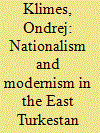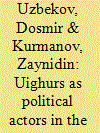| Srl | Item |
| 1 |
ID:
138247


|
|
|
|
|
| Summary/Abstract |
This study explains the intellectual history and ideology of the Turkic insurgency and the East Turkestan Republic in Kashgar in 1933–34. Texts in periodicals from the period suggest that the insurgency was defined by its intellectual elites more as a nationalist enterprise than as a religious one. The insurgency’s ideologists established important national attributes of the East Turkestani nation, particularly its national name, homeland, symbology, and history, and they also articulated East Turkestani national interests, particularly political independence, representative government, and modernization. Regardless of the arguably low degree of social penetration of the ideas of the elites among common society and the small extent to which policy was actually implemented, the intertwining of East Turkestani national identity and interests with political self-government and modernization was an ideological concept that had a profound impact on all subsequent administrations in Xinjiang.
|
|
|
|
|
|
|
|
|
|
|
|
|
|
|
|
| 2 |
ID:
134142


|
|
|
|
|
| Publication |
2014.
|
| Summary/Abstract |
In the Middle Ages, the Uighurs, who are one of the oldest and largest peoples of Central Eurasia (CE), were driven into East Turkestan and then conquered by the Qing Empire. The Chinazation policy carried out in relation to these people led to the mass exodus of the freedom-fighting Uighurs to the CE countries.
The Uighurs are vigorously engaged in economic activity; in other spheres they are traditionally closed and alienated from the outside world, which prevents them from becoming actively integrated into contemporary society.
This article analyzes the roots and reasons for this social phenomenon, which is having a certain influence on the foreign and domestic policy of the Kyrgyz Republic (KR), as well as on political stability and security of the entire Central Asian region.
|
|
|
|
|
|
|
|
|
|
|
|
|
|
|
|
| 3 |
ID:
178901


|
|
|